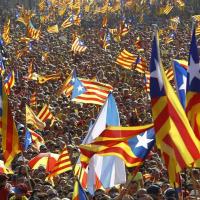
Only working class struggle can guarantee the right to decide and resist austerity
It has been estimated that on the 11 September at least 1.8m people took to the streets of Barcelona, in the annual ’Diada’ demonstration for Catalan independence. The human mass stretched over at least 11kms. The mobilisation formed a massive ‘V’ down Barcelona’s two main roads, symbolising a V for the right to Vote on the question of independence from Spain. It is clear the people of Catalonia want to excercise this right. Polls have indicated that up to 80% think there should be such a vote.
The mobilisation represented a cross-section of society and was a sea of red and yellow, the colours of Catalonia. Despite the official leaders of the protest attempting to confine the demonstration to strictly national demands, many people wore yellow anti-cuts t-shirts and some attempted to raise a political left voice. Socialismo Revolutionario (CWI in the Spanish state) intervene with ‘La Brexta’, a Catalan language version of our paper.
A referendum on the 9 November has been announced by the Catalan parliament. It is likely that when it is actually called, the governing right wing PP party will block it by legal challenges and the Constitutional Court will most likely deem it illegal. The Rajoy government have one eye on the referendum in Scotland and will do anything to avoid such a vote taking place in Catalonia, at this stage. The CIU, the governing capitalist party in Catalonia, appear split on the question. Many in the leadership are talking of postponing the referendum following the court’s decisión. Yet Catalan President, Artur Mas, speaks of calling early Catalan elections. All seem to agree that the "rule of law" cannot be broken, which is ultimately preparing the ground for accepting the Court ruling banning the referendum.
The ERC (Republican Left, a social democratic, pro-independence party leading in the polls) are calling for an illegal vote, but this is more a tactic from a party looking to seem the most determined fighters for Independence, rather than a realistic strategy. While calling abstractly for "civil disobedience", the ERC gives no clear indication of how this disobedience would be organised or what it would look like. They have ruled out mobilising the working class in a meaningful way, such as in a general strike. The truth is all the Catalan capitalist parties are facing higher expectations but have less options to realise a vote. It is critical that the leadership of the independence movement is not left in the hands of these people.
Working class struggle
Only the mobilisation of the working class and people of Catalonia can force the hand of the Spanish state and allow a genuine referendum to take place. For this, the workling class can only depend on its own forces, and its own methods of workers’ struggle. For example, a united call for a general strike in Catalonia in defiance of the ruling of the Constitutional Court would get a tremendous response. Such a movement also requires unity to be forged with the working class in struggle throughout the Spanish state, also suffering the impact of the PP’s austerity policies, who could be appealed to for support in the struggle to let Catalans democratically decide on their future.
Whether or not the referendum takes place, legal or not, the question of what type of Catalonia the people want should be at the top of the agenda. A Catalonia led by the CIU/ERC will not be much different from one led by PP or the pro-capitalist social democrats, PSOE. The struggle for independence must be linked with the struggle to end austerity, to end capitalism and to radically improve the living conditions of all Catalans and peoples across Europe.
An independent Catalonia in Europe would not get a better deal from the vultures of capital in the EU. The CIU’s policies are the same as the PP on economic questions. The ERC argues its strategy for independence would be more social. But there is nothing in the ERC’s programme that shows it would do more for the working classes than any other pro-capitalist party.
Across the Spanish state, the working class is drawing radical conclusion as to the nature of the capitalist crises. The growth of IU, CUP and Podemos is a sign of this. In Barcelona, it is likely there will be some sort of united left challenge called “Guanyem" (‘we win’), based around Ada Colau, leader of the anti-evictions movement. This is a positive development. We must grasp the opportunity to fight for a genuine socialist Catalonia, linked to the struggle against capitalism and austerity across Spain.
We need a programme that argues for non-payment of the debt, the ending of all austerity measures, for investment in public services based on needs, for the right of self-determination, and the nationalisation of the banks and key sectors of the economy, under workers’ control and management.
With a programme such as this, working people in Catalonia can voluntarily link up with workers across the Spanish state in a socialist confederation, and also with workers in countries like Greece and Portugal, fighting for an alternative socialist Europe for the mass of people and not the capitalist elite. This is the best way to win independence and avoid the division of the workers of Europe and Spain.
- For a socialist Catalonia and socialist confederation – free and equal – of the Iberian peninsula
- Unite all the struggles – for a united front of the Left with a socialist programme
- For a socialist Europe

Be the first to comment